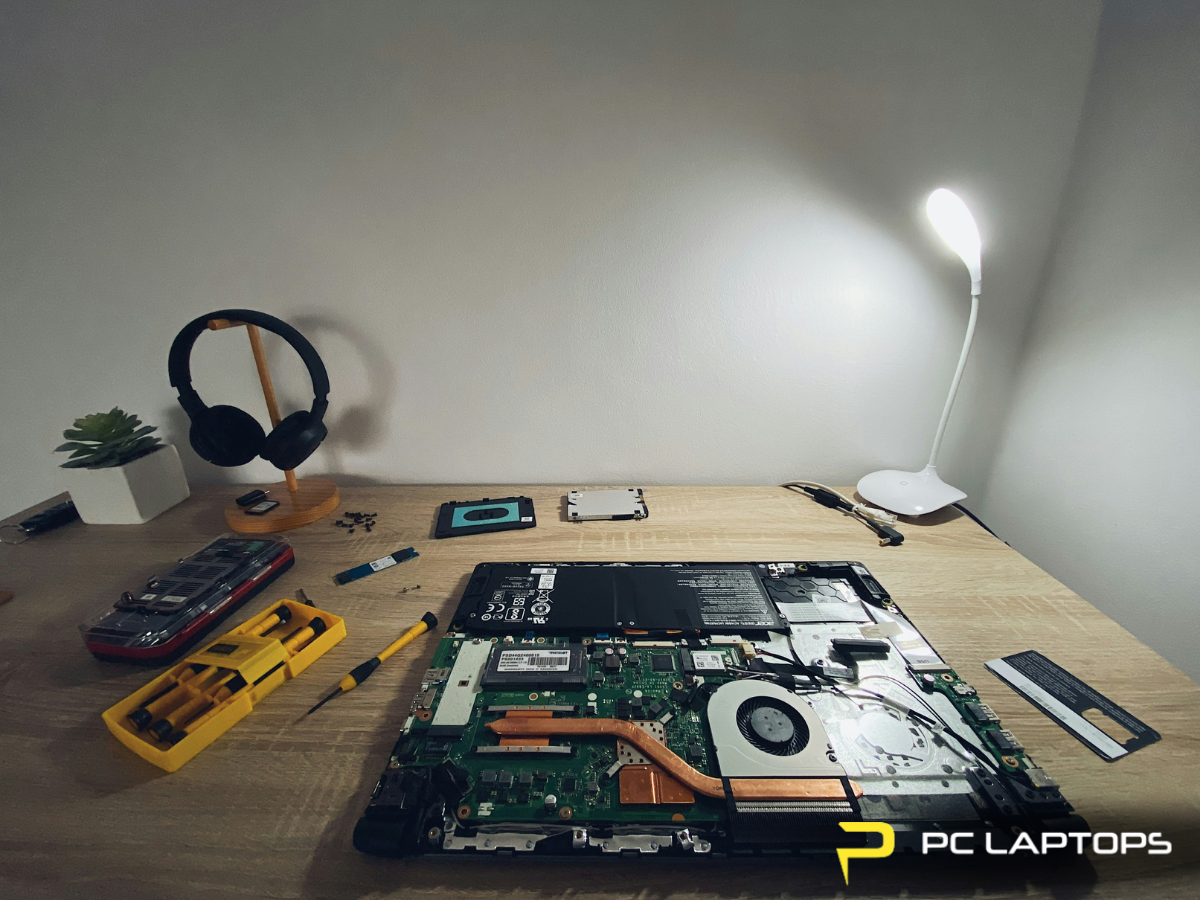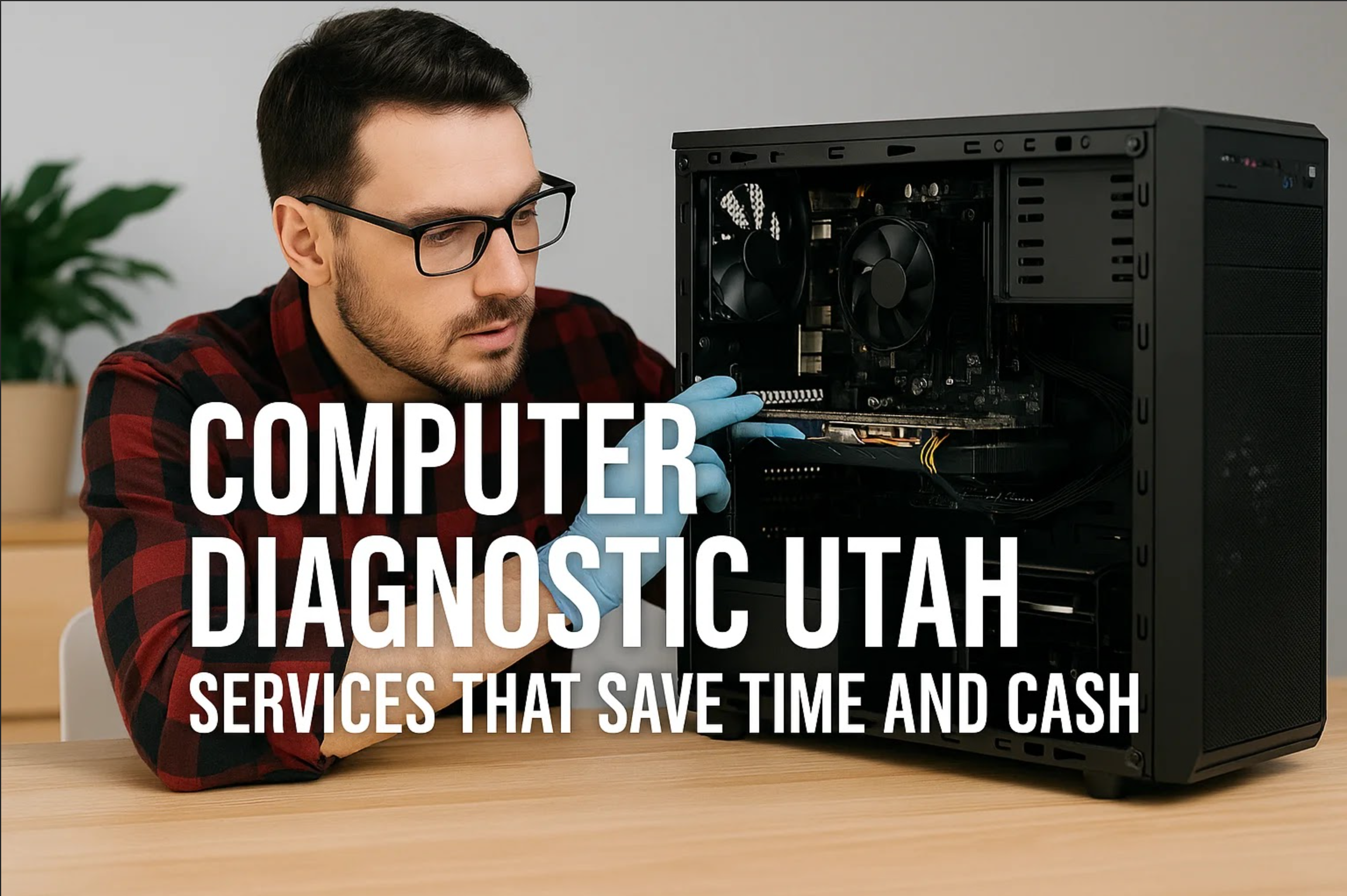Common PC Upgrades to Consider

Common PC Upgrades to Consider
Thinking about upgrading your computer? You don’t always need to buy a whole new PC to get faster performance. Some of the best PC upgrades—like adding RAM, switching to an SSD, or improving your GPU—can dramatically improve your PC’s performance without replacing the entire computer. Whether you’re working, gaming, or streaming, these common PC upgrades can extend your system’s life and make your computer feel brand new. And if you're in Utah, PC Laptops is your trusted partner for all your hardware upgrade needs.
At A Glance: The Best PC Upgrades to Improve Performance Without Replacing Your Computer
Upgrade to an SSD to reduce boot times and speed up file access. It’s the single biggest performance boost for older machines.
Increase your RAM if you multitask often; 16GB is ideal for most users; 32GB+ is best for creatives or heavy users.
Swap your GPU if you game, edit video, or do 3D work; newer cards drastically improve visuals and speed.
Upgrade your CPU if your system still lags after other upgrades. Requires checking motherboard compatibility.
Check your PSU if adding power-hungry parts; a failing or weak PSU causes crashes and limits performance.
Improve cooling with better fans or liquid cooling to prevent thermal throttling.
Add more storage (SATA or NVMe SSDs) to avoid system slowdowns and storage limits.
Upgrade your case for better airflow, future-proofing, and easier cable management.
Don’t skip software optimization: a clean OS install, updated drivers, and removed bloatware can make a big difference.
If your PC is crashing, lagging, or outdated, targeted upgrades are often cheaper and smarter than buying new.
Why You Should Consider Upgrading Your Computer
Is your PC running slower than usual? Are you dealing with long boot times, lagging applications, or low storage space? These are all signs that it’s time for an upgrade.
Buying a whole new computer might not be necessary. Often, replacing just a few key hardware components can give your PC a serious performance boost. Whether you’re gaming, multitasking, or just browsing the web, upgrading your computer is a cost-effective way to keep your current PC running longer and more efficiently.
When you upgrade your PC, you improve its responsiveness, speed, and longevity—all without the cost of a new machine.
1. SSD Upgrade: A Major Step Toward a Faster Computer
One of the best PC upgrades you can make is swapping out your old hard drive for a solid-state drive (SSD). SSDs are known for their fast read/write speeds and instant responsiveness.
Benefits of an SSD Upgrade:
- Reduces boot times from minutes to seconds
- Makes your computer feel significantly faster
- Improves your PC’s performance for tasks like launching apps, transferring files, or streaming content
- More durable and energy-efficient than traditional HDDs
Whether you're using a desktop or gaming laptop, switching to an SSD is one of the first things you should consider to improve performance.
If you’re unsure which storage drive is compatible with your current hardware, PC Laptops can help you choose the right component.
2. RAM Upgrade: Handle More Tasks Without Slowing Down
Memory is essential for multitasking. When you run multiple programs at once—like having several browser tabs open, editing a document, and streaming music—your RAM helps keep everything smooth.
Why You Should Consider a RAM Upgrade:
- Allows your system to handle multiple tasks simultaneously
- Reduces system crashes and freezes
- Enhances the performance of gaming and creative software
How Much RAM Do You Really Need?
- 8GB: Fine for basic users
- 16GB of RAM: Ideal for most users, including gamers and professionals
- 32GB+: Great for advanced users who work with video editing, large datasets, or virtual machines
RAM can significantly enhance the overall system performance and is a smart, affordable upgrade if your computer needs a quick boost.
Looking for a RAM upgrade in Utah? PC Laptops offers quick and reliable installations tailored to your current PC.
3. GPU Upgrade: For a Better Gaming Experience
If you're a gamer or creative professional, upgrading your graphics card (GPU) can make a huge difference in your PC’s performance. A better GPU means smoother gameplay, faster rendering, and more immersive visuals.
Why You Should Upgrade Your GPU:
- Drastically improves gaming performance
- Supports new features in modern games and applications
- Enhances display quality for high-resolution monitors
- Enables faster performance for 3D rendering, video editing, and design work
For those looking to build the best PC for gaming, or improve performance on a gaming computer, your GPU is the heart of the experience. Upgrading this hardware component can breathe new life into an aging system.
Not sure what the best graphics card is for your system? PC Laptops offers expert advice on selecting the right components for your gaming laptop or desktop.
4. CPU Upgrade: Boost Your System’s Brainpower
Your processor (CPU) manages everything your computer does, from launching programs to handling background tasks. If your PC is lagging despite recent upgrades, your CPU might be the bottleneck.
When to Upgrade:
- You’ve already upgraded RAM and SSD, but performance is still lacking
- You’re using applications that demand high clock speed and processing power
- You want to speed up video editing, rendering, or gaming
Upgrading a CPU can be a bit more complex. It often requires checking motherboard compatibility, updating BIOS, and possibly upgrading your CPU cooler to prevent overheating.
PC Laptops can handle these complex upgrades for you and ensure your hardware components work together seamlessly.
5. Power Supply Unit (PSU): Keep Your PC Running Smoothly
If you’ve added powerful new components to your PC—like a new GPU or CPU—you might also need a power supply upgrade. A weak or outdated PSU can lead to system instability or even damage.
Signs You Need to Upgrade:
- Random shutdowns or restarts
- GPU or CPU isn’t performing at full potential
- You're adding multiple components that increase total power draw
A new PSU will keep your computer running safely and efficiently. PC Laptops ensures all PC parts are properly powered and tested.
6. Cooling System: Maintain Peak Performance
Heat is the enemy of performance. When your PC gets too hot, components throttle their speed to avoid damage—this slows everything down.
Cooling Upgrade Options:
- Replace thermal paste on CPU/GPU
- Install larger case fans or more efficient CPU coolers
- Consider liquid cooling for high-end systems
Upgrading your cooling system improves your PC’s performance and extends the life of internal parts. It’s an essential step if you’ve recently upgraded other hardware components.
7. Storage Expansion: Don’t Run Out of Space
Running out of storage space can slow down your system, limit app performance, and make file management a nightmare. Adding a secondary drive or switching to a larger SSD is a smart move.
Types of Storage Drives:
- SATA SSDs: Affordable, great for general use
- NVMe SSDs: Faster and more efficient for gaming or creative work
- External Drives: Great for backups and large file storage
Freeing up storage space and upgrading your storage drive are easy ways to make your computer run faster and more efficiently.
8. Upgrade Your PC Case for Better Airflow and Flexibility
Your PC case may not directly affect performance, but it can impact cooling, space, and future upgrades.
Why Consider a New Case:
- Improve airflow for better cooling
- Make space for new components like GPUs or larger fans
- Enhance cable management and aesthetics
A better case helps keep your entire computer organized and future-proofed. PC Laptops can help you pick a case that supports your current hardware and anticipated upgrades.
9. Operating System & Software Optimization
Sometimes the first thing you need isn’t hardware—it’s software. A fresh install of Windows and updated drivers can make a big difference.
Software Tune-ups Include:
- Reinstalling OS
- Updating drivers and BIOS
- Removing bloatware
- Optimizing startup processes
This is one of the easiest ways to make your computer feel like new again. PC Laptops provides full OS installation and system cleanup services.
10. How to Know When It’s Time for an Upgrade
Ask yourself the following:
- Are you constantly frustrated by slow boot times or laggy apps?
- Are your games running poorly despite tweaking settings?
- Is your PC overheating or shutting down during basic tasks?
- Do you find yourself unable to install the latest apps or OS updates?
If you answered yes to any of these, it’s time for an upgrade. And you don’t need to spend a fortune—many PC upgrades are affordable and instantly noticeable.
Tips Before You Buy New Components
Before rushing to upgrade:
- Consider factors like compatibility, power, and physical space
- Always check your current hardware against the requirements of the new component
- Prioritize the most impactful upgrades based on your usage
- If you're unsure, consult the experts at PC Laptops
Buying a whole new computer might not be necessary if you're strategic about upgrading the right components.
PC Laptops: Your Partner in Performance
If you're located in Utah, PC Laptops upgrades are the smart choice. From diagnosing performance issues to installing the latest hardware, we take the stress out of upgrading your computer.
Why Choose Us:
- Free performance diagnostics
- Professional installation of all major PC hardware upgrades
- Access to the best PC parts for your needs and budget
- Fast turnaround and friendly local support
- Lifetime service guarantee on qualifying repairs
Whether you're looking to give your PC a refresh or build the best PC for your workflow or gaming needs, PC Laptops has the expertise and tools to get the job done right.
Final Thoughts: Upgrading vs. Replacing
In many cases, you can improve your PC’s performance without buying a whole new machine. Just a few common PC upgrades—like more RAM, a new SSD, or a better GPU—can completely transform your entire PC.
Still unsure about which components to consider? That’s where we come in.
Let PC Laptops walk you through a guide to the best upgrade options based on your goals and your system. Whether you want a faster computer, a better gaming experience, or just a machine that can handle your daily tasks, we’ve got you covered.
Want to improve performance without replacing your whole setup?
📍 Stop by PC Laptops in Utah or visit pclaptops.com to schedule your custom upgrade service today.



